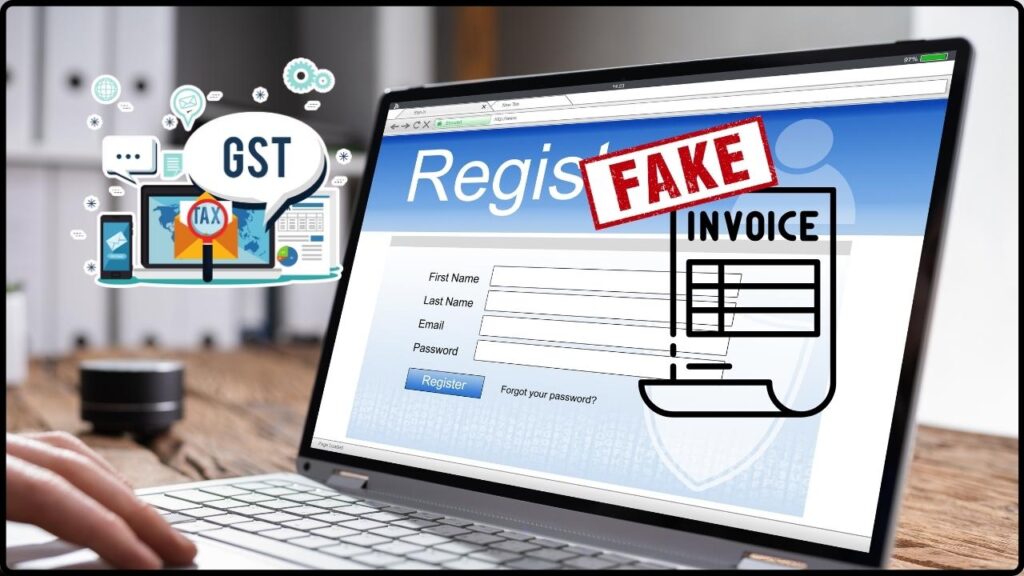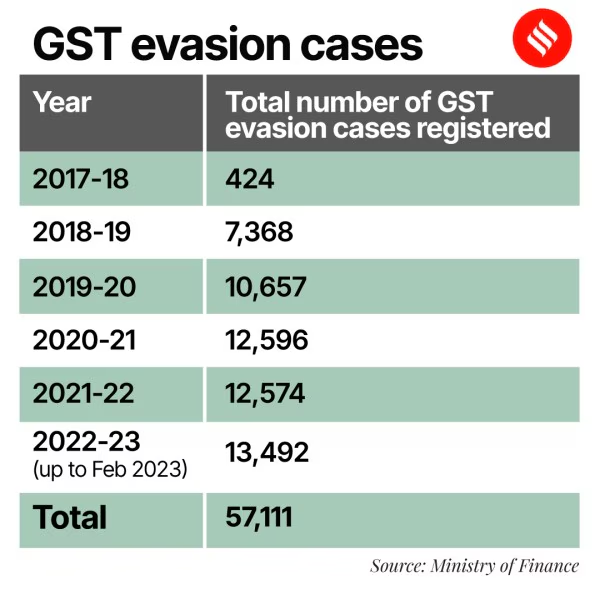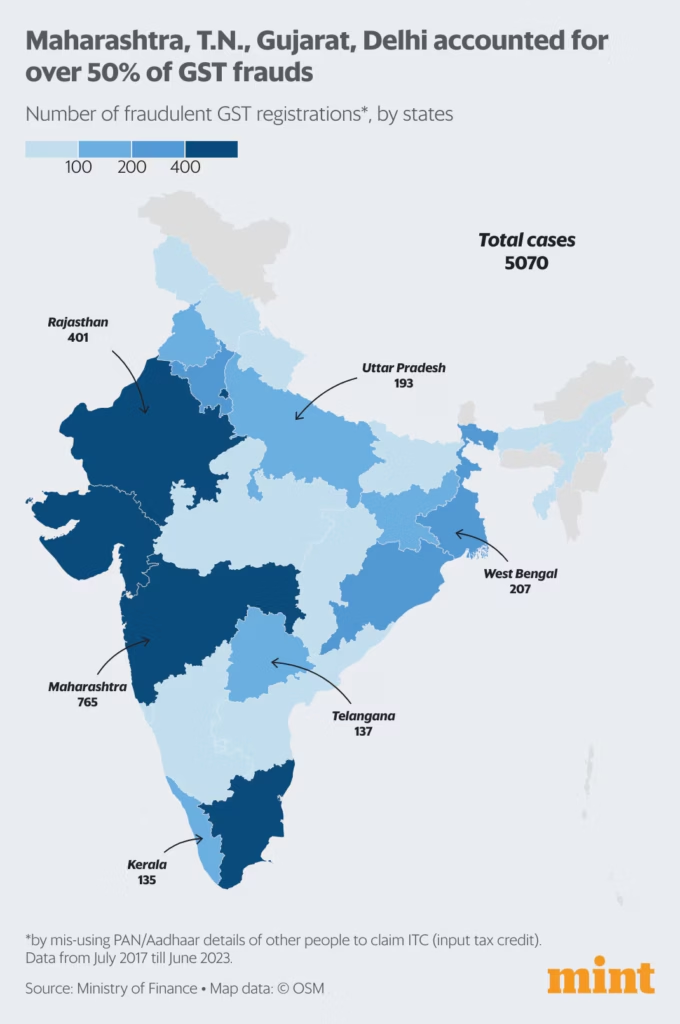Accountant Hacks Firm’s GST Portal and Steals ₹1.80 Crore: In a shocking case of internal fraud, an accountant from Greater Noida hacked his employer’s GST portal and siphoned off a whopping ₹1.80 crore through fake invoices. This crime, which surfaced after a routine audit, highlights the growing risks associated with cyber fraud in businesses of all sizes. The fraudulent activity took place over several months, and the accused, now on the run, exploited the company’s financial system to create fictitious invoices to claim taxes that were never owed. This article delves deep into how this fraud was carried out, its repercussions, and how businesses can protect themselves from such incidents.
Accountant Hacks Firm’s GST Portal and Steals ₹1.80 Crore
Internal fraud is an ever-present risk for businesses, especially when it comes to managing financial systems like GST portals. The case of the accountant from Greater Noida who stole ₹1.80 crore with fake invoices is a stark reminder of the potential vulnerabilities in any company’s operations. By implementing stronger security measures, monitoring financial activities closely, and educating employees about cybersecurity, businesses can significantly reduce their risk of falling victim to such fraud.

| Key Information | Details |
|---|---|
| Accused | Abhinav Tyagi, Accountant from Greater Noida |
| Fraud Amount | ₹1.80 Crore |
| Method of Fraud | Fake invoices uploaded to GST portal |
| Period of Fraud | December 2024 to March 2025 |
| Discovery | July 2025, during a financial audit |
| Legal Action | FIR registered under various sections of IPC |
| Business Impact | Financial loss, reputational damage, and legal costs |
| Lesson | Importance of strong internal controls and security |
| Reference Link | TaxScan News on GST Portal Fraud |
The Case: How It Happened
Abhinav Tyagi, an accountant at a home decor export firm in Greater Noida, had full access to the company’s GST portal. For five years, he was trusted with the company’s financial systems, giving him a perfect opportunity to exploit the system. The fraud took place between December 2024 and March 2025, during which Tyagi uploaded fake invoices to claim Input Tax Credit (ITC) benefits.
The invoices he generated were from seven non-existent companies, including BAU Handicrafts, Ujjav Handicrafts, and United Security Services. Tyagi used these fake documents to claim ₹1.80 crore in tax credits, money that was never due to the GST department. Since the fraud was carried out through legitimate channels, the false claims went unnoticed for months, showing how easy it can be to manipulate financial data when proper safeguards aren’t in place.
The Aftermath: Repercussions of Accountant Hacks Firm’s GST Portal and Steals ₹1.80 Crore
Once the fraud was uncovered, the business faced a myriad of consequences, both immediate and long-term. The direct financial loss of ₹1.80 crore was just the tip of the iceberg.
1. Financial and Reputational Damage
Aside from the financial loss, the company now faces a lengthy legal battle and potential reputational damage. Companies rely on their financial credibility to maintain relationships with partners, clients, and suppliers. When such fraud is exposed, trust can be broken, and it may take years to regain business relationships. Many clients may choose to take their business elsewhere, fearing that the company can no longer protect their interests.
2. Legal and Compliance Issues
The business also has to deal with legal ramifications, as a police complaint was filed, and an FIR was registered against the accountant. Tyagi faces charges for cheating, forgery, impersonation, and criminal intimidation. This adds more stress to the company, which must now navigate the legal complexities of recovering from such a blow.
In addition to the criminal case, the company might face penalties from the GST department, and it could be subjected to more scrutiny in future audits. Non-compliance with tax laws, even if done unknowingly, can result in penalties and interest payments.
3. Internal Breakdown and Loss of Employee Trust
Another consequence is the internal breakdown it causes within the company. Employees may lose trust in the organization’s leadership if they feel that they were not adequately protected from internal threats. In cases like these, management needs to provide clear communication and possibly reassess internal controls, which might create temporary instability within the workforce.

How Businesses Can Protect Themselves: A Step-by-Step Guide
The key takeaway from this case is the importance of securing your business’s financial systems. Here’s a step-by-step guide on how businesses can protect themselves from internal fraud and safeguard their GST portals.
1. Implement Multi-Factor Authentication (MFA)
One of the easiest ways to secure any online portal is through Multi-Factor Authentication. By enabling MFA on your GST portal, you ensure that even if someone gets hold of login credentials, they can’t access the system without a second layer of verification. This extra security can be a lifesaver when it comes to protecting sensitive data.
Example:
In many cases, a simple SMS code or email confirmation can be a game-changer in preventing unauthorized access.
2. Regularly Monitor Access Logs
Just as you check your bank statements, it’s vital to monitor the access logs on your financial systems. Regularly reviewing who has accessed the GST portal and when can help you spot suspicious activity before it escalates.
Example:
If your accountant logs in to the GST portal at odd hours or from an unfamiliar device, this is a red flag. Establish a routine for checking access logs and compare them against your company’s regular operations.
3. Use Role-Based Access Control
Not everyone in your company needs access to sensitive financial data. By using role-based access control (RBAC), you can restrict users based on their job responsibilities. For instance, junior accountants should not have the same access privileges as a senior auditor.
Example:
An employee who works in sales shouldn’t be able to access the firm’s GST portal at all. This segregation limits the chances of a single individual manipulating the system.
4. Conduct Regular Audits
It’s essential to perform regular internal and external audits of your financial data. Audits help identify discrepancies and unusual patterns that might indicate fraudulent activity. In the Greater Noida case, the fraud was uncovered during a routine financial audit, which proves just how effective audits can be.
Example:
Schedule quarterly or biannual audits, depending on your business’s size. External auditors bring fresh eyes to your financial records, which can be invaluable.
5. Educate Your Staff About Security Protocols
Employees are the first line of defense when it comes to cybersecurity. Make sure your team is educated about the importance of secure passwords, phishing scams, and the risks of social engineering. A simple training session can go a long way in preventing fraud.
Example:
You can send out monthly security tips or even organize an annual cybersecurity training seminar to keep everyone updated on the latest threats.
6. Leverage Technology for Fraud Detection
Businesses can use AI-powered fraud detection tools and software to spot irregularities in real-time. These tools can flag potentially fraudulent activities, such as unusually large claims or mismatched invoice data, before they are processed.
Example:
Tech companies offer automated systems that flag anomalies in financial transactions and alert companies of suspicious activity, ensuring swift intervention.

Preventing Internal Fraud: Practical Advice
While external threats like hackers and cybercriminals are often in the news, internal fraud is just as dangerous, if not more so. Employees with insider knowledge can exploit weak points in your system. Here are some additional strategies to prevent fraud:
1. Ensure Segregation of Duties
To prevent fraud, no one person should be able to control all aspects of the financial process. Segregation of duties ensures that tasks like invoicing, approval, and payment are handled by different individuals. This makes it much harder for anyone to carry out a fraudulent act without being detected.
2. Create a Whistleblower Policy
If an employee notices suspicious activity, they should have a safe and anonymous way to report it. A well-implemented whistleblower policy helps businesses catch fraud early and protect their financial integrity.
3. Keep Software and Systems Updated
Many cases of cybercrime occur because businesses fail to update their software. Outdated software can have vulnerabilities that hackers (or internal fraudsters) can exploit. Regular updates and security patches should be part of your routine maintenance.
Hostel Inmates Cry Foul as GST Hike Sends Rents Soaring in Chennai
GST Confusion Ends? Inside the High-Impact Training for DDOs and Dealers in Dimapur
How to Add or Edit Bank Details on GST Portal Without Errors—Full Process Explained










